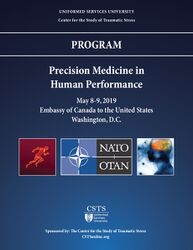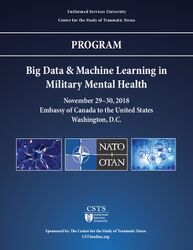NATO Panel Meetings
The mission of the Human Factors and Medicine Panel is to provide the science and technology base for optimizing health, human protection, well being and performance of the human in operational environments with consideration of affordability. This involves understanding and ensuring the physical, physiological, psychological and cognitive compatibility among military personnel, technological systems, missions, and environments. This is accomplished by exchange of information, collaborative experiments and shared field trials.
Personalized Medicine in Mental Health and Performance
Embassy of Canada to the United States
Washington, D.C., May 8-9, 2019
The medical field is committed to delivering evidence-based care, but the evidence used is often from population-wide studies that does not always allow for tailored approaches reflective of an individual patient’s biological makeup, history, and responses to environmental factors. This may contribute to less than optimal prevention strategies, diagnostics, and responses to treatments. However, there have been great advances in some areas of medicine such as oncology that use Precision Medicine to customize treatment approaches based on an individual patient’s profile in the context of evidence-based care. The use of Precision Medicine will ultimately have a positive impact on military readiness and performance. The main objective is to harness and encourage new advances in personalized approaches to optimize: 1) mental health, including ensuring medical readiness, prevention/diagnosis/treatment of disorders, and return to duty; and 2) mental health aspects related to military-relevant mission performance.
Leveraging Technology in Military Mental Health
Embassy of Canada to the United States
Washington, D.C., November 29-30, 2018
Leveraging technology represents the greatest opportunity for advancing military mental health in over a century. Across the NATO alliance all partners are contending with a significant mental health burden particularly in military relevant areas e.g. PTSD (Post-Traumatic Stress Disorder), suicide. Leveraging technology will be part of a concentrated effort to mitigate its impact. Oncology, cardiology, radiology and surgery have made incredible advances over the past two to three decades aided in large part by leveraging technology. Mental health is lagging behind in the application of these advances. Big data, biomarkers, neuro-imaging, mobile and online interventions, simulation and serious gaming will augment or replace conventional approaches across the key domains of military mental health (i.e. research, education/training, diagnosis, treatment and prevention). Taking advantage of these technologies will contribute to greater force readiness and enhance treatment of the ill and injured.








